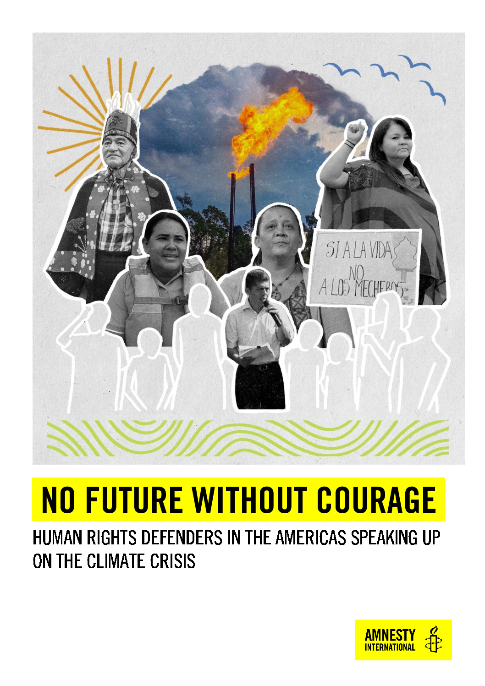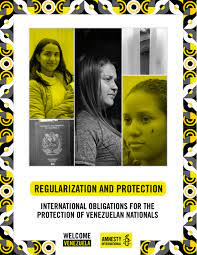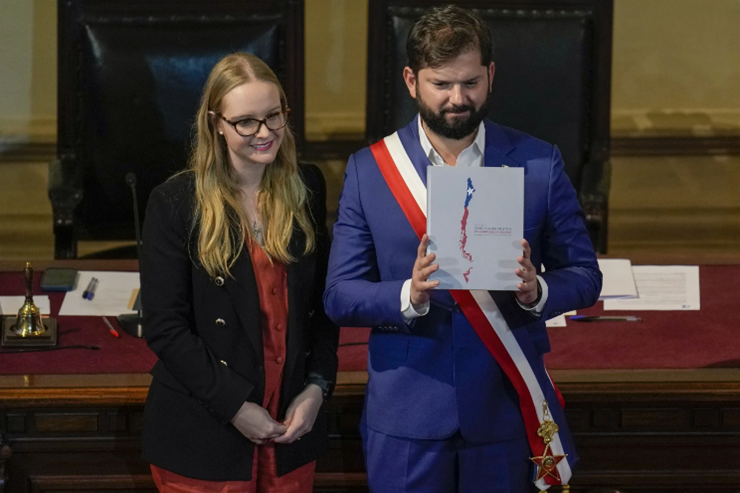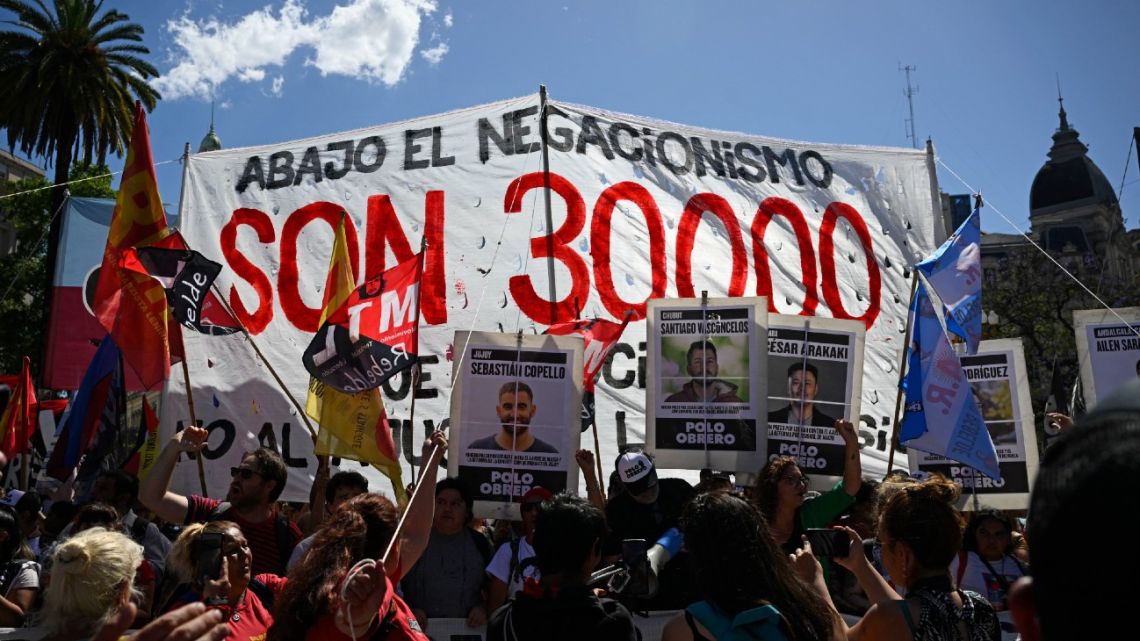This month we bring you news that:
- Regional – Amnesty has a new report focused on human rights defenders in the Americas, the world’s deadliest region for those defending land, territory and the environment.
- Colombia – Amnesty has a new report on the lack of a safe space to defend human rights in Colombia, calling for a complete review of the model for protecting human rights defenders
- Brazil – Amnesty calls on the Brazilian Federal Government to implement a national plan to reduce homicides committed by police officers in the country.
- Peru – Amnesty has updated its Urgent Action calling on the Peruvian government to repeal its decree, dictating the expulsion of all foreigners with an irregular migratory status
- Venezuela – The Venezuelan government has agreed that opposition candidates for the 2024 Presidential election can appeal bans on running for office placed upon them by the state.
- Chile – Amnesty has updated to the Urgent Action calling for the end to police impunity, following an intervention by the UN special rapporteurs on peaceful assembly and extrajudicial execution.
- Argentina – President-elect Javier Milei takes office on 10th December, human rights day, with protests and concerns relating to his pronouncements during the election campaign.
REGIONAL
 In a new report, No future without courage: Human rights defenders in the Americas speaking up on climate crisis, Amnesty presents the cases of six people, groups and organisations who are defending human rights in the context of the climate crisis in Argentina, Brazil, Canada, Colombia and Ecuador. The report notes that environmental defenders are at the forefront of the struggle for climate justice in the Americas but are not meaningfully included in decisions on these issues. The Americas is the world’s deadliest region for those defending land, territory and the environment.
In a new report, No future without courage: Human rights defenders in the Americas speaking up on climate crisis, Amnesty presents the cases of six people, groups and organisations who are defending human rights in the context of the climate crisis in Argentina, Brazil, Canada, Colombia and Ecuador. The report notes that environmental defenders are at the forefront of the struggle for climate justice in the Americas but are not meaningfully included in decisions on these issues. The Americas is the world’s deadliest region for those defending land, territory and the environment.
COLOMBIA

Amnesty International has published a major report on human rights defenders at risk, Hope at risk: The lack of a safe space to defend human rights in Colombia continues. Finding that violence against HRDs, social leaders and rural communities has not abated since President Petro took office in 2022, we propose a long series of new policies and actions for the Colombian government. These include more resources for the National Protection Unit and those who investigate and prosecute the perpetrators. But the main call is for a complete review of the model for protecting HRDs which would include contributions from the UN, donor states and NGOs.
The Peace Community of San José de Apartadó (PCSJA) has denounced the collaboration between the army and paramilitaries in the municipality of Tierralta, Córdoba. 12th September, masked men identified as members of the 17th Brigade and paramilitary intimidated the residents. Also, the PCSJA denounce the frequent incursion of the AGC (Clan del Golfo paramilitary narcotraffickers) into the homes and lands of the community, terrorising its residents, while units of the army and public prosecutors idly stand by. Residents fear that if they denounce the AGC they will be killed.
Colombia Reports that President Petro has replaced the peace negotiator Danilo Rueda with Otto Patiño, who has led the peace negotiations with the ELN (National Liberation Army). This follows the failure to secure ceasefires and peace accords on the 2016 model with the FARC with many other illegal armed groups, which are at the centre of the President’s policy of “Total Peace”.
In a positive development, the government has recognised that trade unionists, 3,328 of whom have been killed between 2018 and 2023 according to Justice for Colombia (JFC), are also victims of the conflict. JFC notes, ‘It represents a radical shift in tone from previous administrations, which, according to Petro, facilitated or even encouraged shocking violence against the union movement.’ Trade unionists classified by previous governments as ‘internal enemies’ should be entitled to reparations.
In another positive development, the Peace Accord’s Transitional Justice (JEP) has announced that they have opened a case to investigate sexual and gender-based violence by the FARC (Revolutionary Armed Forces of Colombia) and by the Security Forces during the conflict leading up the 2016 Peace Accord. This will include such violence on individual members of the FARC, including children, women and LGBTQ+, and on individual members of the Security Forces (and include paramilitaries). They have identified 35,178 victims.
The Inter-American Commission on Human Rights (IACHR) issued Resolution 66/2023 on November 20, 2023, ‘to grant precautionary measures in favour of current members of the leadership of the Association of Displaced Persons of Catatumbo (ASODESCAT) in Colombia, in the belief that they face a risk of suffering irreparable harm to their rights’. This obliges Colombia to take specific actions to protect ASODESCAT from threats and attacks on its members.
BRAZIL

A resident protests a deadly police operation in Baixada Santista in São Paulo, Brazil, on August 2, 2023.Amnesty International calls on the Brazilian Federal Government to implement a national plan to reduce homicides committed by police officers in the country. This follows police killings of at least 83 people between 28 July and 27 September in the State of Bahia. The State should engage with civil society, in particular with the black population, and follow international law and norms on the use of force. In 2022 the police killed more than 6,400 people, according to the Brazilian Forum of Public Security.
Human Rights Watch has published a new report on police killings in Brazil: They Promised to Kill 30. They focus on revenge killings, giving the example of the military police killing 28 people in response to the killing of a police officer in São Paulo State. Following interviews with the police and other bodies, victims and witnesses, HRW has documented torture, extrajudicial killings and the terror imposed by the police on some communities. In many cases the police and public prosecutors have covered up the evidence and the police Ombudsman for São Paulo has received death threats.
Following the burning of a train and 30 buses impeding workers from getting home and the closure of schools in Rio de Janeiro on 23 October, Amnesty International is calling on the authorities to take effective action. But this must be done without adopting actions that cause even more rights violations. Public security policy has been entirely dependent on repressive and abusive practices, combined with a lack of accountability in the corruption in State institutions. These have contributed to the alarming strengthening of militias and organized crime over many years.
The Guardian reports on President Lula’s response to the increasing violence across the country by paramilitary groups, ‘militias’, and organised crime. The air force, navy and army have all been employed to protect airports, ports where drugs are exported, and the borders with Paraguay and Ecuador where much of the drugs are trafficked into Brazil. One security expert says, “We don’t have a plan. We have a gigantic problem – but what we see are impromptu movements from each of the different spheres of government to show that they are doing something.”
PERU
 On 14 November, the Peruvian government issued a legislative decree dictating the expulsion of all foreigners with an irregular migratory status, putting at risk countless Venezuelans who were unable to apply for temporary protection before the 10 November deadline. In a recent report, Regularization and Protection, Amnesty reminded Peruvian authorities of their international obligations regarding non-refoulement. Amnesty has issued an update to its earlier Urgent Action calling on the Peruvian government to repeal this decree immediately.
On 14 November, the Peruvian government issued a legislative decree dictating the expulsion of all foreigners with an irregular migratory status, putting at risk countless Venezuelans who were unable to apply for temporary protection before the 10 November deadline. In a recent report, Regularization and Protection, Amnesty reminded Peruvian authorities of their international obligations regarding non-refoulement. Amnesty has issued an update to its earlier Urgent Action calling on the Peruvian government to repeal this decree immediately.
VENEZUELA
The Venezuelan government has held a referendum on whether Venezuela has a claim to the oil-rich Essequibo region of neighbouring Guyana, claiming that 95% have voted for the government to adopt the territory as part of the Venezuelan state. However, there is scepticism regarding the Venezuelan government’s claim that 10.5 million people voted in the referendum, with the actual number believed to be much lower. Ex-president Hugo Chavez could only reach 10 million votes at the height of his popularity; there are currently 21 million people eligible to vote in the country.
Both countries have increased military activity on the Guyana-Venezuela border, with Brazil sending troops to its own frontier over concerns of escalation. The decision to hold the election is believed to have been made as a strategy to unite Venezuelan voters behind a common cause ahead of the Venezuelan presidential elections. The elections are due to be held in 2024, where issues such as Venezuela’s economic collapse and the fleeing of more than 7 million people out of the country are likely to be key issues.
The International Court of Justice (“the ICJ”), responding to Guyana’s request for the ICJ to take provisional measures, had ordered Venezuela to refrain from taking any actions that might alter the current situation in the disputed territory. The court also directed both parties to not take any actions to make the dispute more difficult to resolve, although this did not include an explicit order to cancel the referendum called by the Venezuelan government, in which the electorate allegedly voted to reject ICJ administration.
The Venezuelan government has agreed that opposition candidates for the 2024 Presidential election can appeal bans on running for office placed upon them by the state. The Venezuelan government had banned Maria Corina Machado from running and had suspended the result of the 2023 opposition primary, after Machado won over 90% of the vote cast. Turnout was believed to have been high at roughly 2.4 million votes. The primaries were a condition of a wider agreement between the Venezuelan government, opposition parties, and the US, under which some Trump-era economic sanctions against the Venezuelan government on oil, mining, and finance were relaxed by the Biden administration. The appeals are due to be decided by the end of the year.
CHILE

by Constitutional Council President Beatriz Hevia
A referendum is to be held in Chile on 17 December 2023, voting on a new political constitution drafted by the Constitutional Council. The last draft was resoundingly rejected in September 2022. Among the articles that have generated most controversy is an order for the expulsion “in the shortest time possible” of foreigners who enter Chile “clandestinely or through unauthorized routes.” There are concerns that another article could make abortion fully illegal in Chile. Amnesty International had previously raised their concerns about the new draft.
There has just been a significant update to the Urgent Action calling for the end to police impunity, following many human rights violations during the 2019 protests. On 27 November 2023, UN special rapporteurs on peaceful assembly and extrajudicial execution raised their alarm at the lack of criminal prosecution of any police commander and reiterated that “it is the responsibility of the state to hold commanders accountable.” The AIUK site doesn’t yet reflect this revision, which now refers to the UN intervention. So please use this to send future letters/emails, now extended till 23rd January.
One person badly injured during the 2019 protests was Moisés Órdenes. There was an Urgent Action earlier this year, when the public prosecutor decided to close its investigation into seven out of the 13 officers charged with the attack; that decision was subsequently rescinded. The investigation has now finished, and the police officers involved in Moisés’ case have been charged with obstruction of the investigation and falsification of public instruments; an oral trial will soon be held. The parallel criminal file on the attack on Moisés is also very advanced and will soon reach an oral trial.
ARGENTINA

Activists join the Madres de Plaza de Mayo Association in
their weekly protestPresident-elect Javier Milei takes office on December 10th. Since his victory, hundreds of activists gathered in Buenos Aires to denounce Milei and vice-president-elect Victoria Villarruel’s views on the dictatorship-era disappearances of tens of thousands of people. The head of the Abuelas de Plaza de Mayo human rights group, Estela de Carlotto, is to request a meeting with the new President. Milei has routinely vowed to hold a plebiscite on whether to repeal the country’s 2020 landmark legalisation of abortion, and promising to shut the country’s ministry of women, gender and diversity.
The Urgent Action on behalf of Alberto Nallar has been extended till January 11th He was sentenced to 42 months of imprisonment for the crime of “incitement to commit crimes, incitement to collective violence and uprising or mutiny ”. A human rights lawyer, Alberto Nallar took an active role during the protests in Jujuy Province that began on June 15. He provided support and legal assistance to people detained during the demonstrations. Alberto has also been heavily fined and been disqualified from practicing.
All the best,
South America Team – Richard Crosfield (Colombia and Brazil), David Rogers (Argentina and Chile), James Baird (Venezuela) and Graham Minter (rest of South America). And please don’t forget that you can follow us on our Facebook page and Twitter.